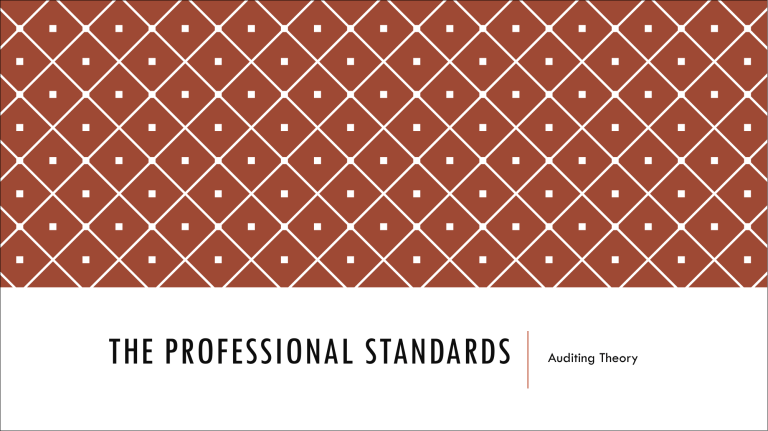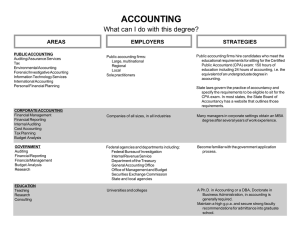
THE PROFESSIONAL STANDARDS Auditing Theory THE PROFESSIONAL STANDARDS Standards are established to measure the quality of performance of individuals, and organizations. Standards relating to the accounting profession concern themselves with CPAs’ professional qualities, the judgement exercised by the CPAs in the performance of their professional engagement, and the CPA firm’s quality control policies and procedures The board of accountancy promulgated ten generally accepted auditing standards (GAAS) that established required level of quality for performing financial statement audits. These standards must be followed by CPAs when auditing financial statements. GENERALLY ACCEPTED AUDITING STANDARDS (GAAS) GAAS represents measures of the quality of the auditor’s performance. These standards should be looked at as a minimum standard of performance that auditors should follow. These ten GAAS are grouped into general, fieldwork and reporting standards. GENERALLY ACCEPTED AUDITING STANDARDS (GAAS) Generally Accepted Auditing Standard (GAAS) General Standards Technical Training and Proficiency Standards of Fieldwork Planning Independence Internal Control Consideration Professional care Evidential matter Standards of Reporting Generally Accepted Accounting Principles Inconsistency Disclosure Opinion PHILIPPINE STANDARDS ON AUDITING (PSA) The auditing and assurance standards council (AASC) has been given the task to promulgate auditing standards, practices and procedures which shall be generally accepted by the accounting profession in the Philippines. The structure of AASC pronouncements is shown in fig. 2.2. STRUCTURE OF AASC PRONOUNCEMENTS AASC Pronouncements Framework for Assurance Engagements Related Services Audit Review Other Assurance Engagements Agreed-upon Procedures Engagement PSA 100 - 999 PSA 2000 2699 PSA 3000 3699 PSA 4000 4699 PSA 1000 1999 PSA 2700 2999 PSA 3700 3999 PSA 4700 4999 Compilation Engagement SYSTEM OF QUALITY CONTROL Quality control are policies and procedures adopted by CPA’s to provide reasonable assurance of conforming with professional standards in performing audit and related services. Under Philippine standards on quality control (PSQC) 1, a firm has an obligation to establish a system of quality control designed to provide it with reasonable assurance that the firm and its personnel comply with professional standards and regulatory and legal requirements, and that the report issued by the firm are appropriate in the circumstances. SYSTEM OF QUALITY CONTROL In this regard, engagement teams: vImplement quality control procedures that are applicable to audit engagement vProvide the firm with relevant information to enabling the functioning of that part of the firm’s system of quality control relating to independence; and vAre entitled to rely on the firm’s system unless information provided by the firm or other parties suggest otherwise. ELEMENTS OF A SYSTEM OF QUALITY CONTROL PSA 220 states that the audit firm should implement policies and procedures designed to ensure that all audits are conducted in accordance with PSAs. vLeadership responsibilities for quality on audits vEthical requirements vIndependence vAcceptance and continuance of client relationships vHuman resources and assignment vEngagement performance vMonitoring ENGAGEMENT PERFORMANCE vDirection Assistants should be informed of their responsibilities, the nature of the entity’s business, potential problems that may arise and the detailed approach to the performance of the engagement. vSupervision This involves monitoring the progress of the audit, resolving accounting and audit issues, and considering the level of consultation appropriate for the engagement. ENGAGEMENT PERFORMANCE vReview Work performed by assistants should be reviewed to consider whether the audit procedures, evidence and documentation are appropriate to support the conclusion reached. vConsultation The firm should establish policies and procedures that encourage firm personnel to seek assistance from authoritative sources wither within or outside the firm. ENGAGEMENT PERFORMANCE vEngagement quality control review The firm should establish policies and procedures requiring an engagement quality control review that provides an objective evaluation of the significant judgements made and conclusions reached in formulating the auditor’s report. vDifference of opinion The engagement team should follow the firm’s policies and procedures for dealing with and resolving differences of opinion that arise within the engagement team, with those consulted and, where applicable, between the engagement partner and the engagement quality control reviewer. QUALITY CONTROL REVIEW Recognizing the importance of professional accountants’ services to the society, the government has also taken steps to ensure that CPAs work to the highest standards which can reasonably be expected from them. The government thru the Professional Regulatory Board of Accountancy (BOA) has required all CPA firms and individual CPAs in public practice to obtain a certificate of accreditation to practice public accountancy. Such certificate is valid for three years and can be renewed after complying with the requirements of board of accountancy. QUALITY CONTROL REVIEW As a condition to the renewal of the certificate of the accreditation to practice public accountancy, the board requires individual CPAs and CPA firms to undergo a quality control review to ensure that these CPAs comply with accounting and auditioning standards and practices. The PRC has created a Quality Review Committee (QRC) which shall conduct a quality review on applicants for registration to practice public accountancy and shall recommend the revocation of the certificate of registrations of CPAs who have not observed the quality control measures or those who have not complied with the standards of quality prescribed for the practice of public accountancy.
